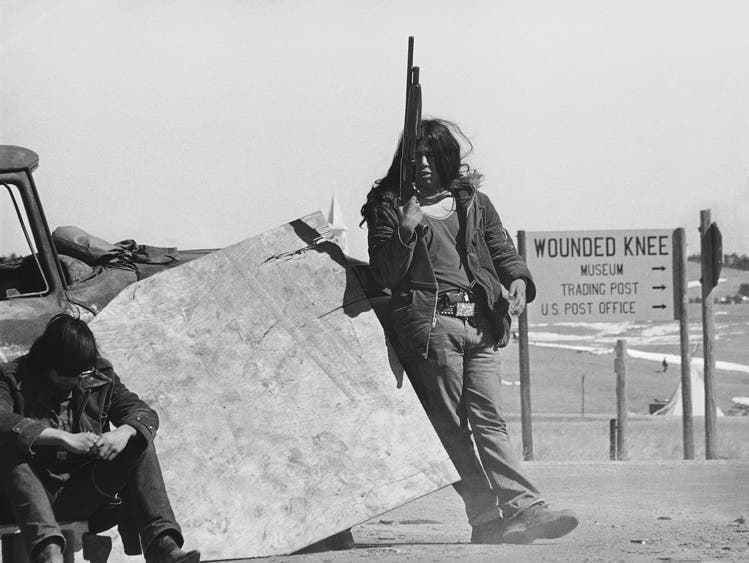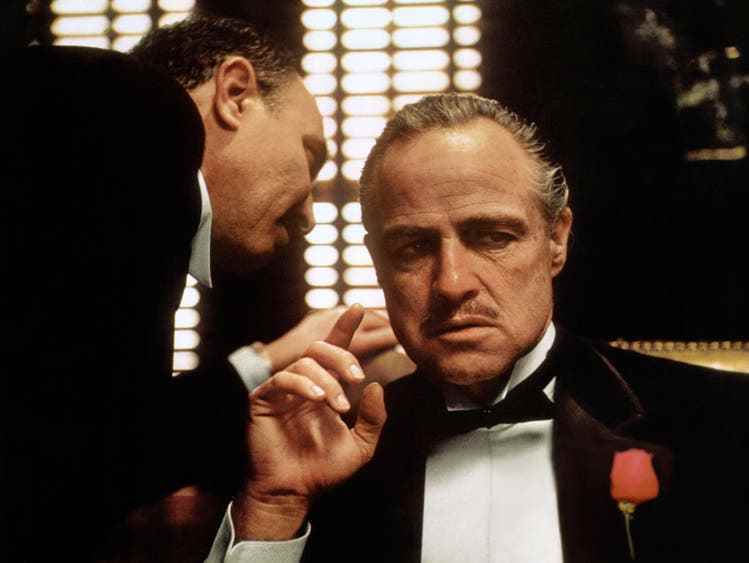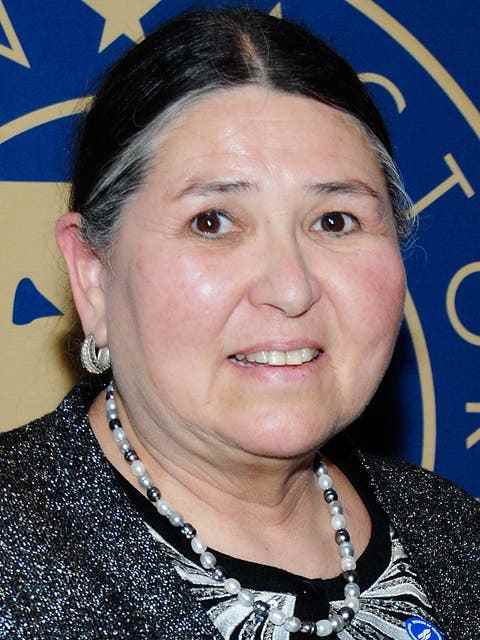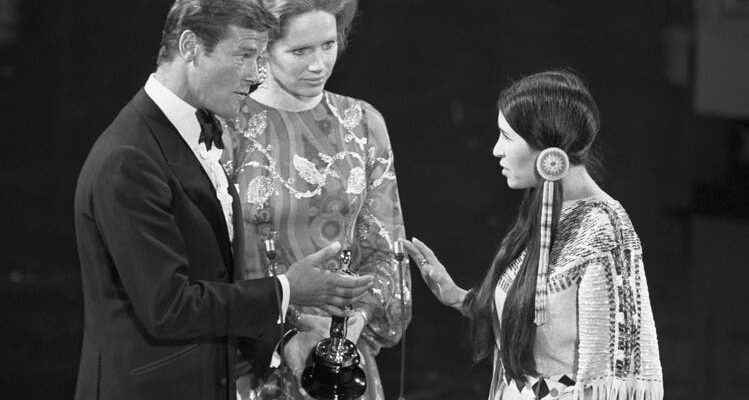In 1973, young Apachin Sacheen Littlefeather made history when she replaced Marlon Brando at the Oscars and raised awareness of the oppression of Native Americans. Her life after that was difficult, but she never kept silent.
A historic moment: Sacheen Littlefeather (right) rejects the Oscar presented by Roger Moore and Liv Ullmann to Marlon Brando on his behalf.
The performance lasted just over a minute. But it should go down in the annals of Oscar history as one of the biggest scandals. In March 1973, when Marlon Brando was to receive the Oscar for best actor for his role in the mafia epic “The Godfather”, the then 26-year-old actress and activist Sacheen Littlefeather took the stage on behalf of the absent Brando. Dressed in the traditional clothing of her people, the Apaches, and in moccasins, she explained to the stunned audience that Brando could not accept this “very generous prize” “because of the treatment of Native Americans by the film industry today”.
In 1973, Sacheen Littlefeather turned down Marlon Brando’s Oscar for Best Actor.
The show didn’t suit everyone. Some of the spectators in the hall reacted with applause, but also with boos. The western star John Wayne is said to have been prevented behind the scenes by six security guards from dragging Littlefeather off the stage, as the actress later recounted. In the days following the performance, she was subjected to ridicule and abuse.
The Oscar Academy has now apologized for the treatment of the now 75-year-old – almost 50 years after the incident. In a June 18 letter published Monday, Academy President David Rubin said Littlefeather’s Oscar speech was “a powerful statement that continues to remind us of the need for respect and the importance of human dignity.” The insults that the actress suffered because of this statement were “unjustifiable and unjustified”. Just as the “emotional burden” experienced as a result and the cost of her acting career are “irreparable”. Littlefeather’s “courage” has not been recognized for far too long.
accusation of imposture
In fact, the scene still impresses today. Politically charged speeches may have been almost the order of the day at the 2022 Oscars. But in 1973, Littlefeather set a precedent with her statement. She was one of the first people to bring social issues to the Oscars stage. As the first boos rang out from the audience, Littelfeather continued her speech in a calm voice to draw attention to what was happening at Wounded Knee at the time. There, supporters of the so-called American Indian Movement (AIM) had occupied the village of Wounded Knee in the Pine Ridge Reservation in the state of South Dakota after the murder of a member of the Lakota tribe. As a result, the AIM campaign received additional international attention.

Members of AIM block the roads to Wounded Knee, South Dakota, in March 1973.
The timing of Littlefeather’s message was clever, as that year the Oscars were broadcast internationally for the first time via satellite. At the time, however, neither the audience, the press nor the 85 million television viewers knew what to think of it. Rumors arose that the whole performance was just a hoax, with Littlefeather an actress hired to direct it. The activist was even accused of being an impostor: she just made up her Indian roots and was actually a Mexican imposter. Littlefeather’s father descended from the Western Apache counting White Mountain Apaches and the Yaqui Indians. Her mother was of French-German-Dutch descent.
Littlefeather had planned the performance in a hurry, as she recently did “Guardians” told. Half an hour earlier, she was still sitting at Brando’s house on Mulholland Drive, waiting for him to finish typing her speech. After all, the manuscript she was supposed to read was several pages long. But when she arrived at the ceremony with Brando’s assistant just before the best actor was announced, Oscars producer Howard Koch told her she wasn’t allowed to read her speech and that she’d be taken off the stage “after 60 seconds would remove». Then everything happened very quickly, according to the activist. “I promised Marlon that I wouldn’t touch his Oscar statue if he won. And I had promised Koch that I would not go beyond 60 seconds. So there were two promises I had to keep.” As a result, she improvised her speech.

Marlon Brando as Don Vito Corleone in The Godfather (1972).
Littlefeather read Brando’s full manuscript to reporters after the ceremony. Afterward, she went back to the actor’s house to follow the reactions to the event on television with him. Brando later said he was appalled by the audience’s reaction to Littlefeather, even though the boos might have been aimed at himself. “You should have at least had the courtesy to listen to her.”
Own acting career suffered from the incident
Today, Littlefeather sees the event as a pivotal moment in the fight for Native American rights. She was the first Indigenous woman to use the Oscars as a platform for a political message. In the years that followed, other artists did the same. The Academy also drew its conclusions from the incident. To this day, artists are no longer allowed to be represented by another person when accepting an award.

Sacheen Littlefeather in a 2010 recording.
The performance also marked a turning point for Littlefeather’s own career as an actress. Apart from a few smaller roles, there were no offers in the film industry in the following years. After the Oscars, she was a red rag for Hollywood, she later complained. That’s why she never fell silent. She fought for the rights of Native Americans into old age.
Today, the 75-year-old no longer seems to hold grudges for what happened at the time. “It’s deeply encouraging to see how much has changed since I didn’t accept the Oscar 50 years ago,” she said in response to the Academy’s apology. And added with a wink: “We Indians are very patient people – it was only 50 years ago.”
